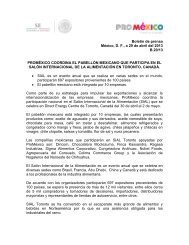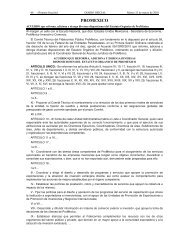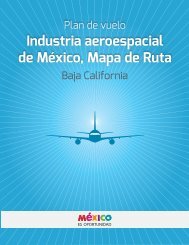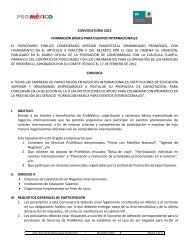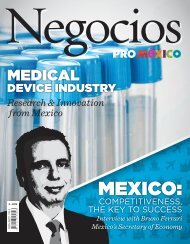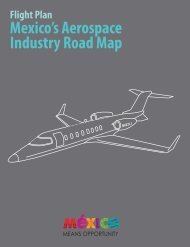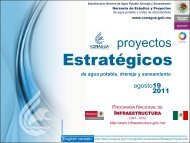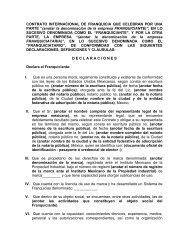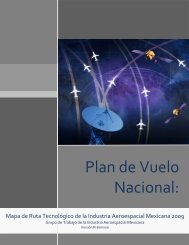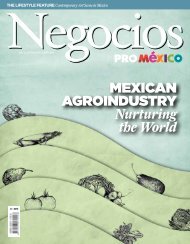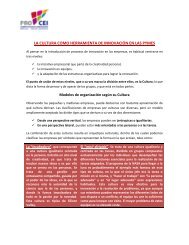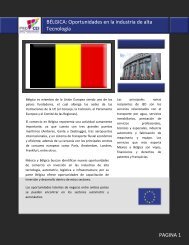mexico renews itself - ProMéxico
mexico renews itself - ProMéxico
mexico renews itself - ProMéxico
Create successful ePaper yourself
Turn your PDF publications into a flip-book with our unique Google optimized e-Paper software.
54 Negocios ProMéxico | The Lifestyle Negocios ProMéxico | The Lifestyle 55<br />
there is<br />
Something<br />
in the Air<br />
A Conversation with<br />
Mario Molina<br />
Mario José Molina-Pasquel Henríquez (born March 19, 1943 in<br />
Mexico City) is the first Mexican-born citizen to ever receive a Nobel<br />
Prize in Chemistry. Along with Paul J. Crutzen and F. Sherwood<br />
Rowland, he is one of the precursors to the discovery of the Antartic<br />
ozone hole. In 1995 he was co-recipient of the Nobel Prize in Chemistry<br />
for his role in elucidating the threat of chlorofluorocarbon gases to<br />
the Earth’s ozone layer. In interview with Negocios, Dr. Molina talks<br />
about how he became interested in science and his life today.<br />
____<br />
by maría josé esteva<br />
photos courtesy of centro mario molina<br />
Johannes Kepler asked himself some 400 years ago: “Why<br />
are things the way they are and not otherwise?” No matter<br />
what the era, it is that same, seemingly naive curiosity<br />
that drives us to look for answers to the questions<br />
that have fascinated mankind since time immemorial. Dr. Mario<br />
Molina, winner of the Nobel Prize in Chemistry, talks to us about<br />
his life and how he has contributed to science.<br />
Mario Molina (Mexico City, 1943) was one of the scientists who<br />
won the Nobel Prize in Chemistry in 1995 for discovering the threat<br />
of certain polluting gases to the ozone layer. Almost 20 years have<br />
passed and Dr. Molina is still hard at work. In interview with Negocios,<br />
he tells us about everything from his early encounters with<br />
science and why we need to take steps to protect the environment, to<br />
what he does during his free time and his passion for music.<br />
—The first “conscious” contact most people have with<br />
science is the typical kid’s chemistry set and the home labs<br />
set up in their bathrooms. What was yours?<br />
As a kid, I started taking an interest in science –when I was<br />
about nine or ten– after reading books about pirates and the<br />
biographies of scientists. Then I got into chemistry experiments<br />
and microscopes. Years later, I started conducting more serious<br />
experiments. I “appropriated” a bathroom at home that wasn’t<br />
being used and turned it into a lab where I conducted proper<br />
experiments, not games. An aunt, a sister of my father who was a<br />
chemist, helped me reproduce the experiments she did at university<br />
in my little “lab”.<br />
—When did you realize that chemistry is all around us?<br />
What was that discovery like?<br />
Studying the sciences made me realize –and this was outside of<br />
school– how important they are to the general wellbeing of mankind.<br />
I gradually specialized in one branch of science: chemistry.<br />
I realized that chemistry plays a role in absolutely everything,<br />
from industrial processes to the food we eat.<br />
—Kids are always asking questions like “Why is the<br />
sky blue?” “Why do onions make us cry?” that can only<br />
be answered by science. Do you remember the kind of<br />
questions you used to ask?<br />
From a very early age, I started asking questions like: What is<br />
chemistry and what makes life possible? How were the elements<br />
and the chemical compounds on our planet created? How were<br />
pharmaceuticals invented?



